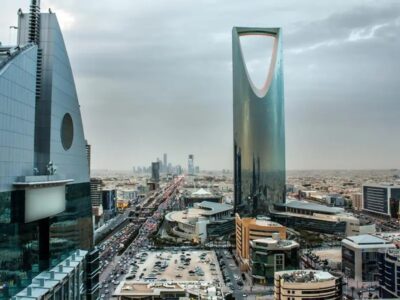The UAE is set to play a key role in the growth of electric mobility in the Gulf region, according to a senior executive of car giant Audi.
Henrik Wenders, senior vice president brand Audi, highlighted the UAE as its citizens have “this inner conviction on the need to integrate next-generation experiences” and are “shaping the future”.
Dubai has already embraced electric mobility with the launch of the Green Charger initiative in 2015 and the more recent installation of more than 240 charging stations across the emirate by the Dubai Electricity and Water Authority (DEWA) in February.
It is more important than ever to focus on sustainability and a greener future, said Wenders who added that Audi’s new brand strategy Future is an Attitude has sustainability at its core. This sustainability is best represented through plans to expand Audi’s electric vehicles range and reduce their carbon footprint.An electric mobility future aside, Wenders talks to Arabian Business about the role of digitalisation in the brand’s campaign, Audi’s vision of the future of the automotive industry and their marketing campaign during the height of the pandemic.

AB: Audi’s reshaped brand campaign seems to fit with the current times through its focus on a sustainable future. Could you tell us more about that?
HW: I think it fits from three perspectives. Number one: it focuses on and emphasises the future through the hashtag #FutureIsAnAttitude. While other brands might focus on luxury, prestige or driving pleasure, Audi is focusing on the future.
Within this, we are also focusing on two areas: sustainability and digitalisation. We are not just producing good looking products; we are also shaping the future.
AB: Could you expand more on sustainability?
HW: It is not just the electrification of our product portfolio that we are working on; we have to also be CO2 neutral in regards to our entire supply chain and our own production facilities. By the year 2050, we at Audi want to be entirely carbon-neutral on the balance sheet.
By 2025, we want to become neutral in regards to our own Audi production plants. By 2025 as well, we will expand our e-portfolio to 30 models, of which around 20 are pure battery electric vehicle models. You have to keep in mind here that we are talking about the automotive industry which is deeply industrialised.
AB: How has your progress towards achieving those goals been?
HW: We are well on track. This company is very value-driven and in this aspect, very German: once you set a goal, you achieve this goal come hell or high water. We have more than 16,000 suppliers and we are holding CO2 workshops to make the CO2 neutral on balance.
Brussels, where we produce the Audi e-tron (Audi’s electric vehicle), was our first plant to become entirely carbon neutral in 2018. Our plant in Hungary was the second to become entirely carbon neutral in October.
AB: Why is it important for Audi to be carbon neutral?
HW: Being entirely carbon future on balance is not just for our customers, but for us a society. Because we need to move towards sustainability as quickly as possible. I am wholeheartedly convinced that the next generation will expect products which are produced entirely carbon-neutral; they are also expecting a digital ecosystem which enables them to have a seamless user experience. We need to be ahead of this wave.

AB: You mentioned digitalisation as the third pillar of the re-branding strategy. Can you expand on that?
HW: The corona pandemic was an accelerator in this. All of a sudden there was the lockdown and we were disconnected from our audience and customers. This is the reason why we emphasised our digital communication channels which are well-established already.
But digitalisation also includes the entire customer journey with elements such as digital formats like online registration or booking tools, online sales, digital consultancy and online servicing. We are even holding launch events online such as the A4 launch in China where we had 700 million online participants. It is not entirely brand new but I would say the interest is increasing.
AB: Did you provide your customers with a virtual showroom and if so in which countries?
(This question was answered by Douâa Jazouli, public relations manager at Audi Middle East)
Covid really helped accelerate this digitalisation for us at Audi Middle East. We started with purchasing a car completely online during Covid lockdown as a way to help our customers conclude their purchasing even while at home. This digital service is currently available only in the UAE and Saudi Arabia but we are planning to expand that in the Middle East. I can’t divulge the figures but I can tell you people here are open to buying cars online and are doing so.
AB: What does this imply about customers in the UAE specifically and the GCC in general?
HW: In the UAE, we are talking about an audience which has always been curious and very tech-savvy.
When I started visiting the region ten years ago, with my first electric cars in my pocket, I was exposed to an audience that is very interested in new technology. I was surrounded by people discussing sustainability and tech and that was ten years ago. It is not a surprise that Expo 2020, which is entirely focused on sustainability, will take place in the UAE.
There is this inner drive here to shape and define the future, an inner conviction and willingness to integrate this next-generation technology. This is why I am convinced we will see a huge shift in the UAE and I can’t wait to come back with very attractive electric cars.
AB: What do you foresee as the main challenges for electric mobility?
HW: The challenge is the velocity as always. When we analyse the business ecosystem of the last hundred years we see that the main issues are either you don’t see the trend or change coming or you do see it coming, but you are underestimating the velocity.
I would say Audi knows about those trends and this is why we are changing and investing as quickly as possible to be prepared. We are not producing smartphones or fashion or furniture, we are producing a very complex product. With the digitalisation of society, the car will become the most sophisticated and challenging smart device on planet Earth and that makes it so exciting from my point of view.
AB: Do you see the global future of the automotive industry to be electric?
HW: The range will further improve thanks to the large demand on battery cells. Battery cells will contain more energy which will allow us to provide more range. With more range, you are all of a sudden on an eye-to-eye level with the internal combustion vehicle. And then, an electrical vehicle will be equally as expensive as an engine combustion vehicle. When the ecosystem provides enough charging infrastructure, you are then just flipping the switch.
This is what you are going to see on a global scale happening this decade. We will see fast growth although, of course, not everywhere in the world and not with the same velocity. But this will co-exist and we need to be prepared for all these different demands.
We will have regions in the world where we will continue with gasoline engines but we will have a high share in place for the regions where there is electric mobility comes and I foresee the GCC as one of those very important regions.

AB: You had just recently joined Audi when the coronavirus pandemic hit. How did the brand adapt to this challenging period?
HW: The corona pandemic was an opportunity to see how professional and how well organised we are already and also to see how the brand is being perceived in such a crisis. It was also an opportunity for the team to see how we define ourselves in society. It sounds so easy but it was not at all. We are a mobility driver so what does a mobility provider say when families all over the planet have to lock themselves down? What do we do when a crisis is going on and fear is in place?
It took us a couple of weeks to define our role but after that, we were able to agree on a communication strategy and behaviour which we summarised back then with the hashtag #AudiTogether. We approached the audience at a global level saying keep distance but stay together.
We also developed social media ideas because people were bored to death at home and we were looking at how to be companions to them.
This is all based on this self-awareness that we are an integral part of the society: we have 85 million fans on social media and millions of customers driving a car with four rings.
That for me was a beautiful experience because I was personally amazed by the reaction of all those fans and it gave me very authentic feedback about Audi’s brand perception out there and how the entire marketing team around the world is communicating together.








